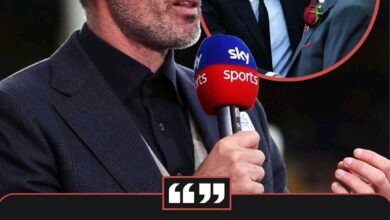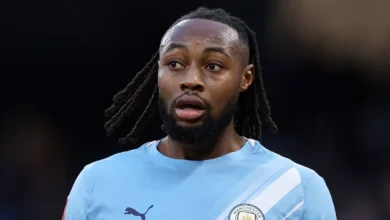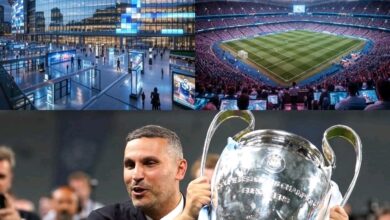Liverpool’s Defensive Revolution: The Strategic Pursuit of Guehi and Leoni

Liverpool Football Club finds itself at a pivotal juncture in what has already been a transformative transfer window. Following their significant early investments in attacking talent with the acquisitions of Jeremie Frimpong, Milos Kerkez, and the marquee signing of Florian Wirtz, the Reds are now turning their attention to fortifying their defensive foundations. The club’s strategic focus has shifted toward securing a double coup that could reshape their backline for years to come: the simultaneous acquisitions of Crystal Palace’s Marc Guehi and Sampdoria’s promising young talent Giovanni Leoni.
This ambitious defensive overhaul comes at a time when Liverpool’s current center-back situation presents both opportunities and challenges. The potential departure of Ibrahima Konate, whose contractual situation has become increasingly precarious, has created an urgent need for reinforcement. With Real Madrid reportedly monitoring the French international’s situation and his current deal entering its final phases, Liverpool’s hierarchy has recognized the necessity of proactive planning rather than reactive scrambling
Marc Guehi represents everything Liverpool seeks in a modern center-back. The 24-year-old England international has emerged as one of the Premier League’s most consistent and reliable defenders during his time at Crystal Palace. His journey from Chelsea’s academy through loan spells that honed his craft, culminating in his £20 million move to Selhurst Park in 2021, demonstrates the kind of development trajectory that Liverpool’s recruitment team values highly.
Guehi’s statistical profile makes for compelling reading. Over the past two seasons, he has maintained an impressive aerial duel success rate of over 65%, while his passing accuracy from deep positions consistently exceeds 85%. These numbers translate to on-field excellence that has caught the attention of England manager Gareth Southgate, who has increasingly relied on the defender for crucial international fixtures. His leadership qualities, demonstrated through his captaincy at various youth levels for England and his growing influence at Palace, align perfectly with Liverpool’s cultural requirements.
The defender’s playing style exhibits the modern versatility that Jurgen Klopp’s system demands. Guehi’s comfort in possession allows Liverpool to build from the back with confidence, while his pace and reading of the game provide the security needed when the team commits players forward in their high-intensity attacking phases. His experience in high-pressure situations, including European competitions and international tournaments, adds another layer of appeal for a club with Champions League ambitions.
Crystal Palace’s valuation of their prized asset reportedly stands at around £70 million, a figure that reflects both his current ability and future potential. While this represents a significant investment, Liverpool’s financial position following their recent Saudi-backed ownership changes has provided the club with unprecedented spending power. The Reds view Guehi as a player who can make an immediate impact while offering long-term value as he enters what should be the peak years of his career.
Paralleling their pursuit of established quality in Guehi, Liverpool’s interest in Giovanni Leoni represents a calculated investment in future potential. The 18-year-old Sampdoria center-back has emerged as one of Italian football’s most promising defensive talents, drawing comparisons to legendary Italian defenders through his combination of technical ability, tactical intelligence, and physical presence.
Leoni’s rapid rise through Sampdoria’s youth system and into their first team has been nothing short of remarkable. Despite his tender age, he has already accumulated significant Serie A experience, demonstrating the kind of maturity and composure that typically takes years to develop. His performances in Italy’s second tier have attracted attention from across Europe, with Liverpool moving quickly to position themselves at the front of the queue for his signature.
The young Italian’s playing profile suggests he possesses the attributes to thrive in the Premier League’s demanding environment. Standing at 6’3″, Leoni combines physical presence with surprising agility and ball-playing ability. His youth career statistics show an impressive record of successful tackles and interceptions, while his comfort on the ball has seen him occasionally deployed in midfield roles, showcasing his versatility.
From a strategic perspective, Leoni represents the kind of signing that Liverpool’s recruitment team, led by sporting director Jorg Schmadtke, has identified as crucial for long-term success. The initial investment of approximately £25 million could prove to be exceptional value if the player develops as expected. Liverpool’s track record of nurturing young talent, combined with their world-class training facilities and coaching staff, provides an ideal environment for Leoni’s continued development.
The Italian’s acquisition also aligns with Liverpool’s broader strategy of building a squad capable of competing at the highest level for an extended period. While Guehi provides immediate quality and experience, Leoni offers the potential to become a cornerstone of the defense for the next decade. This dual approach reflects sophisticated planning that looks beyond short-term fixes toward sustainable excellence.
Central to Liverpool’s defensive recruitment drive is the increasingly complex situation surrounding Ibrahima Konate. The French international, who arrived from RB Leipzig in 2021 for £36 million, has established himself as a crucial component of Liverpool’s defensive structure. His combination of pace, aerial ability, and modern defensive skills made him an instant success at Anfield, forming effective partnerships with Virgil van Dijk and Joel Matip.
However, Konate’s contractual situation has become a source of concern for Liverpool’s hierarchy. With his current deal set to expire in 2026, the club faces a critical decision point. The defender’s representatives have reportedly been seeking improved terms that would reflect his growth in importance to the team and his rising market value. These negotiations have coincided with increased interest from Real Madrid, who view the 25-year-old as a potential long-term replacement for their aging defensive core.
Real Madrid’s interest in Konate is not merely speculative. The Spanish giants have reportedly made preliminary contact with the player’s representatives, exploring the possibility of a summer 2025 move. Los Blancos’ appeal to players of Konate’s caliber cannot be understated – the combination of their illustrious history, competitive environment, and financial resources makes them an attractive proposition for any footballer with ambitions of winning the biggest prizes in the game.
Liverpool’s response to this situation reveals their strategic thinking. Rather than engaging in a potentially destabilizing contract standoff or risking Konate’s departure on a free transfer, the club has chosen to be proactive in securing defensive reinforcements. This approach allows them to negotiate from a position of strength, whether that means ultimately retaining Konate on improved terms or facilitating his departure while having already secured adequate replacements.
The financial implications of Konate’s situation extend beyond his individual case. If Liverpool can secure significant compensation for the French defender – reports suggest Real Madrid might be willing to pay upwards of £60 million – this would partially offset the substantial investments required to bring in both Guehi and Leoni. This kind of strategic squad management reflects the modern reality of elite football, where player trading has become as important as on-field performance in maintaining competitive advantages.
Liverpool’s interest in both Guehi and Leoni extends beyond their individual qualities to how they would integrate into the team’s tactical framework. Under Klopp’s guidance, Liverpool’s defensive system requires center-backs who can excel in multiple phases of play. The high defensive line necessitates pace and recovery speed, while the team’s possession-based approach demands comfort and accuracy in distribution.
Guehi’s experience in similar systems, both at international level and during his time at Palace, suggests he would adapt quickly to Liverpool’s requirements. His ability to step into midfield areas when required, combined with his experience in high-pressing systems, makes him an ideal candidate for Klopp’s setup. The defender’s left-footed preference would also provide tactical flexibility, allowing Liverpool to deploy him alongside right-footed partners while maintaining optimal balance.
Leoni’s development trajectory suggests he possesses the raw materials to eventually excel in Liverpool’s system, though his integration would likely be more gradual. The Italian’s technical foundation and tactical education in Serie A’s defensively sophisticated environment provide an excellent base for adaptation to the Premier League’s unique demands. Liverpool’s coaching staff, renowned for their ability to develop young talent, would play a crucial role in helping Leoni make the transition from Italian football to the intensity of English competition.
The potential for both players to eventually form a partnership represents an intriguing long-term possibility. Their complementary skill sets – Guehi’s experience and leadership combined with Leoni’s physical attributes and potential – could provide Liverpool with a defensive foundation capable of competing at the highest level for many years to come.
The combined investment required to secure both Guehi and Leoni would represent one of the most significant defensive spending sprees in Liverpool’s recent history. Conservative estimates suggest the total outlay could exceed £95 million, a figure that reflects the current market premiums for defensive talent and the specific circumstances surrounding each player’s situation.
This level of investment must be viewed within the context of Liverpool’s transformed financial position. The club’s new ownership structure has provided access to previously unavailable resources, while their consistent Champions League qualification and commercial growth have strengthened their revenue base. The strategic nature of these investments – securing players who should provide value across multiple seasons – aligns with sustainable spending practices that comply with Financial Fair Play regulations.
The timing of these potential acquisitions also reflects broader market dynamics. Center-back prices have increased significantly in recent years, driven by the scarcity of elite defensive talent and the tactical evolution that has increased the position’s technical demands. Liverpool’s willingness to invest heavily in this area demonstrates their recognition that defensive stability forms the foundation for all other tactical ambitions.
From a asset management perspective, both signings represent logical investments. Guehi’s age profile suggests he would retain significant resale value throughout his peak years, while Leoni’s potential development could see his market worth increase substantially. This approach to squad building – combining immediate impact with future value – reflects sophisticated planning that extends beyond purely football considerations.
Liverpool’s defensive recruitment drive must be understood within their broader strategic objectives. The club’s recent investments in attacking talent have created a squad capable of competing for major honors, but defensive solidity remains crucial for translating potential into actual success. The Premier League’s competitive intensity and the Champions League’s tactical sophistication demand defensive foundations that can withstand sustained pressure.
The potential departure of experienced defenders like Joel Matip, whose contract situation also requires resolution, adds urgency to Liverpool’s planning. Building a defensive core that can provide stability across multiple seasons while maintaining the flexibility to adapt to tactical evolution represents a complex challenge that requires careful recruitment and integration strategies.
Liverpool’s approach also reflects broader trends in elite football recruitment. The combination of established quality and emerging talent, supported by sophisticated scouting networks and analytical frameworks, has become the standard approach for clubs with serious competitive ambitions. The Reds’ ability to compete for players of Guehi and Leoni’s caliber demonstrates their continued appeal to top-tier talent despite recent competitive challenges.
As Liverpool navigate this crucial phase of their squad development, the potential acquisitions of Marc Guehi and Giovanni Leoni represent more than simple defensive reinforcements. These signings would signal the club’s commitment to building a squad capable of sustained excellence while adapting to the evolving demands of modern football.
The strategic thinking behind these pursuits – addressing immediate needs while investing in future potential – demonstrates the kind of sophisticated planning that separates successful clubs from those that merely survive. Whether Liverpool can complete these ambitious signings remains to be seen, but their pursuit of both players reveals the scale of their ambitions and their readiness to make the investments necessary to achieve them.
The resolution of the Konate situation, combined with the outcomes of their pursuits of Guehi and Leoni, will likely define Liverpool’s defensive capabilities for years to come. In a sport where margins of victory continue to decrease and competitive advantages become increasingly difficult to maintain, the club’s willingness to invest in defensive excellence may prove to be the foundation upon which future success is built.















